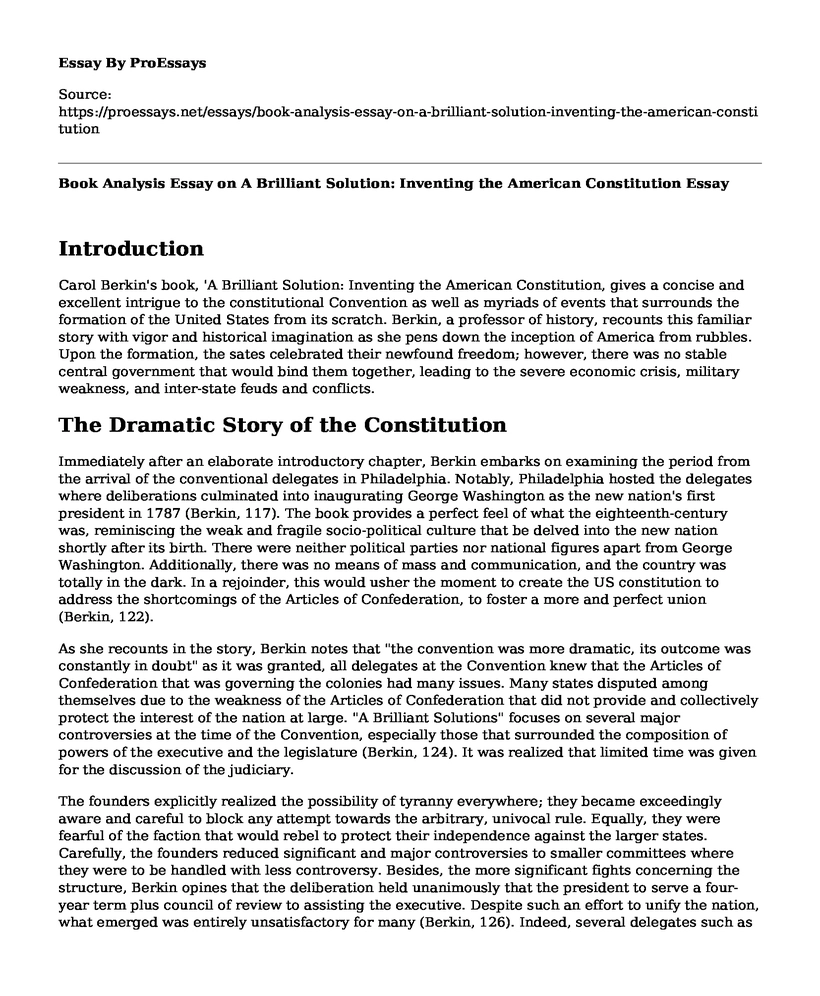Introduction
Carol Berkin's book, 'A Brilliant Solution: Inventing the American Constitution, gives a concise and excellent intrigue to the constitutional Convention as well as myriads of events that surrounds the formation of the United States from its scratch. Berkin, a professor of history, recounts this familiar story with vigor and historical imagination as she pens down the inception of America from rubbles. Upon the formation, the sates celebrated their newfound freedom; however, there was no stable central government that would bind them together, leading to the severe economic crisis, military weakness, and inter-state feuds and conflicts.
The Dramatic Story of the Constitution
Immediately after an elaborate introductory chapter, Berkin embarks on examining the period from the arrival of the conventional delegates in Philadelphia. Notably, Philadelphia hosted the delegates where deliberations culminated into inaugurating George Washington as the new nation's first president in 1787 (Berkin, 117). The book provides a perfect feel of what the eighteenth-century was, reminiscing the weak and fragile socio-political culture that be delved into the new nation shortly after its birth. There were neither political parties nor national figures apart from George Washington. Additionally, there was no means of mass and communication, and the country was totally in the dark. In a rejoinder, this would usher the moment to create the US constitution to address the shortcomings of the Articles of Confederation, to foster a more and perfect union (Berkin, 122).
As she recounts in the story, Berkin notes that "the convention was more dramatic, its outcome was constantly in doubt" as it was granted, all delegates at the Convention knew that the Articles of Confederation that was governing the colonies had many issues. Many states disputed among themselves due to the weakness of the Articles of Confederation that did not provide and collectively protect the interest of the nation at large. "A Brilliant Solutions" focuses on several major controversies at the time of the Convention, especially those that surrounded the composition of powers of the executive and the legislature (Berkin, 124). It was realized that limited time was given for the discussion of the judiciary.
The founders explicitly realized the possibility of tyranny everywhere; they became exceedingly aware and careful to block any attempt towards the arbitrary, univocal rule. Equally, they were fearful of the faction that would rebel to protect their independence against the larger states. Carefully, the founders reduced significant and major controversies to smaller committees where they were to be handled with less controversy. Besides, the more significant fights concerning the structure, Berkin opines that the deliberation held unanimously that the president to serve a four-year term plus council of review to assisting the executive. Despite such an effort to unify the nation, what emerged was entirely unsatisfactory for many (Berkin, 126). Indeed, several delegates such as Virginian Edmund Randolph objected and refused to sign the document. Nonetheless, the constitution broke the impasses between the larger and the smaller states giving enough power to the national government while at the same time respecting state autonomy. Berkin explains that the founders who drafted the constitution arose to the challenges.
Berkin in "A Brilliant Solution," reminds us how truly the founder group was, decked with seriousness and ambitions to see the fruition of their labor to the youngest nation, the Convention of Philadelphia delegates became the "eye" opener to the realization of unity within the today united states of America (Berkin, 128). Some delegates were young to serve as presidents in the document they drafted, however everyone even though the age had long experience from where to draw whether in the continental army, state legislature, or the colonial state.
Out of the fifty-five delegates, some stood out significantly. James Madison primarily became one of them. His careful and splendid notes of the Convention provide us with the best accounts and proceedings (Berkin, 2003). Together with other "nationalists" who favored the expanded power for the national government, tirelessly worked to combat and comb out the feeling of the strong states at the Convention. "Were it to James Madison, the Convention would make a second revolution; he indeed was eager to see the creation of a new government" (Berkin, 130).
Shortly after the delegates had completed their work in Philadelphia, the next step was how to convince the nation to acceptance of the constitution. Out of the many states, just nine were needed to ratify the document, thus to be considered the law of the land. Push and shove became more evidenced as there were opposing states, but at last, in June 1788, they joined to make a list to the ninth state to ratify the constitution. Ideally, this became the hallmark and a dream that was hatched in Philadelphia fashioning into a reality. Berkin presumptuously, agrees that the ratification debates orchestrated in Philadelphia inspired America's most significant contribution to both socio-cultural as well as political ideologies of the land. As opined by Berkin, A Brilliant Solution provided one of the useful touchstones in seeking to entrench controversies among the states as well as creating a strong defense for the country.
Work Cited
Berkin, Carol. A brilliant solution: Inventing the American Constitution. Houghton Mifflin Harcourt, 2003.
Cite this page
Book Analysis Essay on A Brilliant Solution: Inventing the American Constitution. (2023, May 08). Retrieved from https://proessays.net/essays/book-analysis-essay-on-a-brilliant-solution-inventing-the-american-constitution
If you are the original author of this essay and no longer wish to have it published on the ProEssays website, please click below to request its removal:
- Marx and Weber on Power and Inequality Essay
- Critical Essay on Another Country: The Interwoven Lives of Eight in the Shadow of Rufus Scott
- Essay Sample on Ode to the West Wind: Expressing a Revolutionary Vibe
- Essay on Manifest Destiny: Democrats' Expansion Plans Supported by Lincoln
- Socialism: A System of Collective Ownership and Government Control - Essay Sample
- Essay Example on Government Health Insurance Programs: Coverage & Eligibility
- Paper Example on A Gloomy Masterpiece: Exploring Nathaniel Hawthorne's Writing







